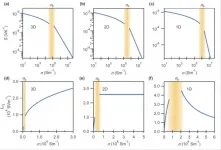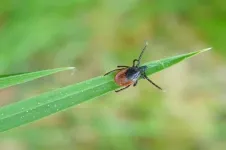The impact of chemotherapy on immune cells in the tumor microenvironment
Research from Queen Mary University of London has revealed novel insights into the effects of chemotherapy on the tumor microenvironment (TME)
2021-04-10
(Press-News.org) Research from Queen Mary University of London has revealed novel insights into the effects of chemotherapy on the tumour microenvironment (TME). The study, published today in Cancer Immunology Research, a journal of the American Association for Cancer Research, found that chemotherapy enhances the anti-tumour actions of immune cells within the TME and their ability to support immune responses against cancer.
Cancers are not just a mass of cancerous cells, but are rogue organs made up of many different cell types, including cells that form connective tissue and blood vessels, and immune cells. These non-cancerous cells have been recruited and corrupted by the cancer to help it grow and spread, and constitute what is known as the TME.
When treating cancer cells with chemotherapy, the cells within the TME are also impacted and previous research has shown that chemotherapy may activate immune cells within the TME to fight against the cancer. In this study, the team, led by Professor Fran Balkwill, investigated the effects of chemotherapy on immune cells called macrophages, which are associated with poor survival across a variety of cancer types. The study focused on high-grade serous ovarian cancer (HGSOC) - the most common type of ovarian cancer.
Chemotherapy switches immune cells to anti-tumour mode
By comparing biopsy samples taken from the omentum (most common site of cancer spread in HGSOC) of 26 patients prior to and after chemotherapy, the team found a significant reduction in the number of macrophages present in the tissues following treatment. Further investigations in samples from other HGSOC patients revealed that chemotherapy switched the remaining macrophages from a pro-tumour to an anti-tumour mode, which may stimulate the patient's immune response against the cancer.
The effects of chemotherapy on macrophages observed in patient samples were also seen in preclinical mouse models of HGSOC previously developed by the team, which recapitulate many aspects of the human omental TME.
As macrophages are associated with poor survival in cancer, the team took their research a step further to determine whether eliminating all macrophages from the TME after chemotherapy could prolong disease-free survival in the preclinical mouse models. To their surprise, removing all macrophages shortly after the completion of chemotherapy caused the mice to relapse quicker. Following three doses of chemotherapy, the macrophages had switched to an anti-tumour mode, and so eliminating the macrophages from the TME actually inhibited the immune response against the tumour and resulted in poorer survival outcomes.
The research was funded by Cancer Research UK, the Wellcome Trust and Wellbeing of Women.
Implications for ovarian cancer treatment
Chemotherapy and surgery are currently the main treatment options for patients with ovarian cancer. Despite chemotherapy working well initially, many patients experience relapse due to the development of resistance against these drugs.
Professor Balkwill from Queen Mary University of London said: "This study enhances our understanding of the impact of chemotherapy on macrophages and other aspects of the immune response. As our work was driven by results first obtained in patient samples and we were able to replicate the findings in our mouse models, we could investigate hypotheses and obtain data that have translational significance.
"We now have effective preclinical models of treatment and relapse that can be used to help identify treatments that build upon the tentative immune response triggered by chemotherapy."
Ultimately, the team hope that their models could help to identify new drug combinations that harness the initial immune-boosting effects of chemotherapy to reduce the number of required chemotherapy doses, minimise toxic side effects and improve survival for patients with ovarian cancer.
INFORMATION:
The results of this study along with previous findings from the team are being presented today during the poster session of the AACR Annual Meeting 2021.
* Research paper: 'Chemotherapy Induces Tumor-Associated Macrophages That Aid Adaptive Immune Responses in Ovarian Cancer'. Owen Heath, Chiara Berlato, Eleni Maniati, Anissa Lakhani, Colin Pegrum, Panoraia Kotantaki, Samar Elorbany, Steffen Bohm, Simon T. Barry, Alessandro Annibaldi, Desmond P. Barton, and Frances R. Balkwill.
Available here after the embargo lifts: https://cancerimmunolres.aacrjournals.org/content/early/2021/03/26/2326-6066.CIR-20-0968
ELSE PRESS RELEASES FROM THIS DATE:
2021-04-10
Patients with non-small cell lung cancer (NSCLC) whose cancer cells have low levels of aneuploidy - an abnormal number of chromosomes - tend to respond better to immune checkpoint inhibitor drugs than patients with higher levels, Dana-Farber Cancer Institute researchers will report at the virtual AACR Annual Meeting 2021.
In analyzing data from hundreds of patients with NSCLC who were treated with these drugs, the researchers found that those whose cancer receded tended to have less aneuploidy in their tumor cells than those whose disease remained stable or worsened. These findings suggest that aneuploidy testing can have an important role in determining which ...
2021-04-10
Tokyo, Japan - Researchers from Tokyo Metropolitan University have shown that a quantity known as "thermoelectric conductivity" is an effective measure for the dimensionality of newly developed thermoelectric nanomaterials. Studying films of semiconducting single-walled carbon nanotubes and atomically thin sheets of molybdenum sulfide and graphene, they found clear distinctions in how this number varies with conductivity, in agreement with theoretical predictions in 1D and 2D materials. Such a metric promises better design strategies for thermoelectric materials.
Thermoelectric devices take differences in temperature between different materials and generate electrical energy. The simplest example is two strips of ...
2021-04-10
From power grids and telecommunications to water supply and financial systems, digital data controls the infrastructure systems on which society relies. These complex, multi-tier systems depend on layered communications to accomplish their tasks - yet every point of contact becomes a potential target, every path of information a potential weak spot for malicious actors to attack.
A team of researchers from the University of Calabria in Italy has developed the first predictive control scheme that can help distributed networks with multiple agents not only identify these ...
2021-04-09
Active surveillance leads to improved quality of life
Men with low health literacy seven times less likely to accept active surveillance
Prostate cancer and active surveillance patient education is needed
Tumor gene profiling is a tool that can help patients with a cancer diagnosis make informed decisions about treatment. In predominantly white populations, among men with early stage, favorable-risk prostate cancer, these tools have been shown to increase patient acceptance of active surveillance -- a common, evidence-based approach to monitor the tumor before a more aggressive treatment, like surgery or radiation.
However, ...
2021-04-09
A new study finds older adults who received positive airway pressure therapy prescribed for obstructive sleep apnea may be less likely to develop Alzheimer's disease and other kinds of dementia.
Researchers from Michigan Medicine's Sleep Disorders Centers analyzed Medicare claims of more than 50,000 Medicare beneficiaries ages 65 and older who had been diagnosed with OSA. In this nationally representative study, they examined if those people who used positive airway pressure therapy were less likely to receive a new diagnosis of dementia or mild cognitive impairment over the next 3 years, compared to people who did ...
2021-04-09
Auroral displays continue to intrigue scientists, whether the bright lights shine over Earth or over another planet. The lights hold clues to the makeup of a planet's magnetic field and how that field operates.
New research about Jupiter proves that point -- and adds to the intrigue.
Peter Delamere, a professor of space physics at the University of Alaska Fairbanks Geophysical Institute, is among an international team of 13 researchers who have made a key discovery related to the aurora of our solar system's largest planet.
The team's work was published April 9, 2021, in the journal Science Advances. The research paper, titled "How Jupiter's unusual magnetospheric topology structures its aurora," was written by Binzheng ...
2021-04-09
For the first time, researchers have been able to obtain data from underneath Thwaites Glacier, also known as the "Doomsday Glacier". They find that the supply of warm water to the glacier is larger than previously thought, triggering concerns of faster melting and accelerating ice flow.
With the help of the uncrewed submarine Ran that made its way under Thwaites glacier front, the researchers have made a number of new discoveries. Professor Karen Heywood of the University of East Anglia commented:
"This was Ran's first venture to polar regions and her exploration of the waters under the ice shelf was much more successful than we had dared to hope. We plan to build on these exciting findings ...
2021-04-09
Tick-borne encephalitis is a disease just as nasty as it sounds. Once bitten by an infected tick, some people develop flu-like symptoms that resolve quietly but leave behind rampant neurological disease--brain swelling, memory loss, and cognitive decline. Cases are on the rise in Central Europe and Russia with some 10,000 incidents reported each year. Vaccines can provide protection, but only for a limited time. There is no cure.
Now a new study describes antibodies capable of neutralizing the virus transmitted by tick bites. These so-called broadly neutralizing antibodies have shown promise in preventing TBE in mice and could inform the development of better vaccines for humans. ...
2021-04-09
Children may not be as infectious in spreading SARS-CoV-2 to others as previously thought, according to new University of Manitoba-led research in CMAJ (Canadian Medical Association Journal).
"Our findings have important public health and clinical implications," writes principal investigator Dr. Jared Bullard, associate professor, pediatrics/child health and medical microbiology/infectious diseases, Max Rady College of Medicine, University of Manitoba and associate medical director, Cadham Provincial Laboratory in Winnipeg, Manitoba. "If younger children are less capable of transmitting infectious virus, daycare, in-person school and cautious extracurricular activities may be safe to continue, with appropriate precautions in place, ...
2021-04-09
When setting SARS-CoV-2 vaccine priorities, Canada should take a more nuanced approach that considers geographic and occupational risk exposures, as 75% of Canadian adults have at least 1 risk factor for severe COVID-19, argues an analysis in CMAJ (Canadian Medical Association Journal).
"Using risk factors for severe COVID-19 in a strategic vaccination strategy may not offer much refinement because of how widespread these conditions are. More detailed weighting of medical, geographic and occupational risks might be required if vaccination is constrained," writes Dr. Finlay McAlister, Faculty of Medicine & Dentistry, University of Alberta, Edmonton, Alberta, with coauthors. "In particular, since the third wave of the COVID-19 pandemic appears ...
LAST 30 PRESS RELEASES:
[Press-News.org] The impact of chemotherapy on immune cells in the tumor microenvironment
Research from Queen Mary University of London has revealed novel insights into the effects of chemotherapy on the tumor microenvironment (TME)




